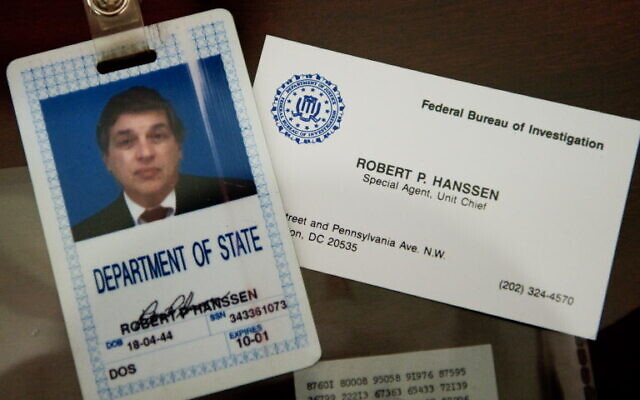WASHINGTON — Robert Hansen, an FBI agent who took more than $1.4 million in cash and diamonds to conduct secret trade deals with Moscow, died in prison Monday in one of the most infamous espionage cases in US history.
Prison officials said Hansen, 79, was found unresponsive in his cell at a federal prison in Florence, Colorado, and later pronounced dead. A person with knowledge of the matter told The Associated Press that he is believed to have died of natural causes. The person was not authorized to publicly discuss details of Hanssen’s death and spoke to the AP on condition of anonymity.
He had been serving life in prison without the possibility of parole since 2002, after being convicted of 15 counts of espionage and other charges.
Hansen had disclosed information about US intelligence-gathering since at least 1985, including extensive details on how US officials tapped into Russian espionage operations.
Because he was in the important New York counterintelligence department of the FBI, tasked with pursuing foreign spies, he was able to cover their tracks while directly investigating Moscow’s agents in the United States.
He was finally caught exchanging messages with his Russian handlers in suburban Virginia outside Washington on February 18, 2001.

FILE: The identification and business card of former FBI Agent Robert Hansen is seen inside a display case at the FBI Academy in Quantico, Virginia May 12, 2009. (Paul J. Richards / AFP) No use after July 5, 2023 20:05:22 GMT
Hansen is believed to have been partially responsible for the deaths of at least three Soviet officers who were working for US intelligence and were executed after being exposed.
He received over $1.4 million in cash, bank funds, diamonds, and Rolex watches in exchange for providing highly classified national security information to the Soviet Union and later Russia.
He apparently did not pursue a lavish lifestyle, instead living in a modest suburban house in Virginia with his family and driving a Taurus.
Hansen later said that he was motivated by money rather than ideology, but explained in a 1985 letter to his Soviet handlers that a large payoff could lead to complications because he could not spend it without ringing a warning bell. Could have done
Authorities said that using the alias “Ramon Garcia”, he passed around 6,000 documents and 26 computer discs to his handlers. He elaborated on eavesdropping techniques, helped confirm the identities of Russian double agents, and revealed other secrets. Officials also believed that he had told Moscow about a secret tunnel built under the Soviet embassy in Washington.
The FBI called him “the most damaging spy in bureau history”.
Hansen joined the FBI in 1976 after first serving as a policeman in Chicago.
Nine years later he took a position in the New York City office of counterintelligence, where agents invested heavily in tracking and trying to recruit Soviet officials to the United Nations.
He went undetected for years, but later investigations found missed red flags. After becoming the focus of the hunt for a Russian mole, Hansen was caught taping a garbage bag full of secrets under a footbridge in a park in a “dead drop” for Russian operatives.
At the time he was caught, he was considered the most damaging mole ever to pass American secrets to a foreign government, having handed over thousands of classified American documents to the Soviet Union and later the Russians.
These included US nuclear war plans, software to track espionage investigations, and the identities of US sources in Moscow, including Dmitri Polyakov, or “Tophat”, a Soviet general who between the 1960s and 1980s commanded the United States. The states had fed the secrets of their country to America.
Polyakov was arrested in 1986 and executed several years later.
While for many years the FBI and CIA knew they had a well-placed informant in their ranks, Hansen was not the top suspect for long.
He had a wife and six children, lived frugally, and mixed with Washington’s conservative Catholic elite.
American investigators eventually turned their attention to Hansen with little information provided by a Russian defector.
He was secretly tracked and recorded in his office for months before being caught in a Virginia dead drop.
In May 2002, he pleaded guilty to 15 counts of espionage in exchange for a prosecution agreement not to seek the death penalty.
“I apologize for my behavior. I am ashamed of it.” Hansen said at his sentencing.
“I have opened the door for slander against my completely innocent wife and children,” he said. “I have deeply hurt many.”
The story was made into a film in 2007 called “Breach”, starring Chris Cooper as Hansen and Ryan Phillippe as a young Bureau operative who helps bring him down.
According to the Bureau of Prisons, the FBI has been notified of Hanssen’s death.
